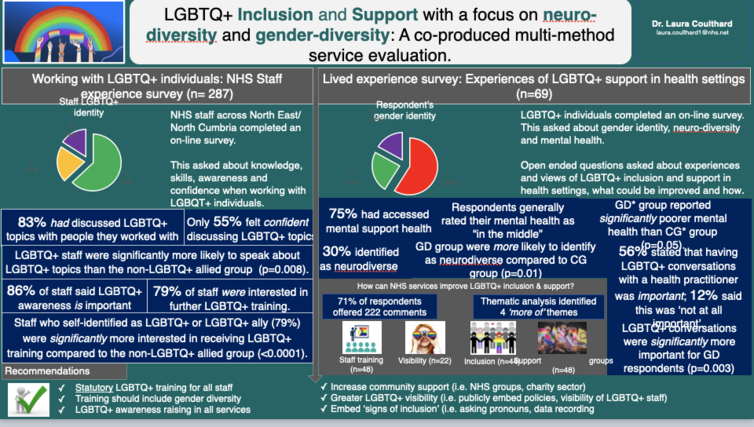
NHS staff across North East/North Cumbria completed an on-line survey. This asked about knowledge, skills, awareness and confidence when working with LGBQT+ individuals:
- 83% had discussed LGBTQ+ topics with people they worked with
- Only 55% felt confident discussing LGBTQ+ topics
- LGBTQ+ staff were significantly more likely to speak about LGBTQ+ topics than the non-LGBTQ+ allied group (p=0.008)
- 86% of staff said LGBTQ+ awareness is important
- 79% of staff were interested in further LGBTQ+ training
- Staff who self-identified as LGBTQ+ or LGBTQ+ ally (79%) were significantly more interested in receiving LGBTQ+ training compared to the non-LGBTQ+ allied group (<0.0001).
LGBTQ+ individuals completed an on-line survey. This asked about gender identity, neuro-diversity and mental health. Open ended questions asked about experiences and views of LGBTQ+ inclusion and support in health settings, what could be improved and how:
- 75% had accessed mental support health
- Respondents generally rated their mental health as “in the middle”
- GD* group reported significantly poorer mental health than CG* group (p=0.05).
- 30% identified as neurodiverse
- GD group were more likely to identify as neurodiverse compared to CG group (p=0.01)
- 56% stated that having LGBTQ+ conversations with a health practitioner was important; 12% said this was ‘not at all important’.
- LGBTQ+ conversations were significantly more important for GD respondents (p=0.003)
Recommendations
- Statutory LGBTQ+ training for all staff
- Training should include gender diversity
- LGBTQ+ awareness raising in all services
- Increase community support (i.e. NHS groups, charity sector)
- Greater LGBTQ+ visibility (i.e. publicly embed policies, visibility of LGBTQ+ staff)
- Embed ‘signs of inclusion’ (i.e. asking pronouns, data recording)
You can read more about the research work by Dr. Laura Coulthard ([email protected]) HERE
